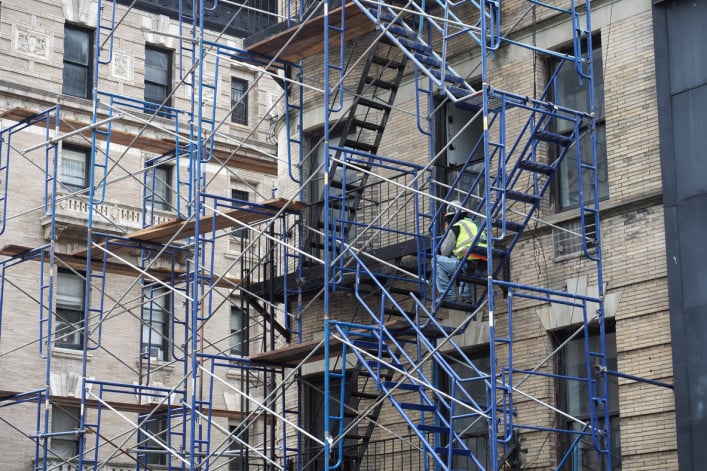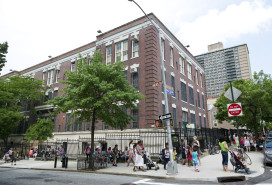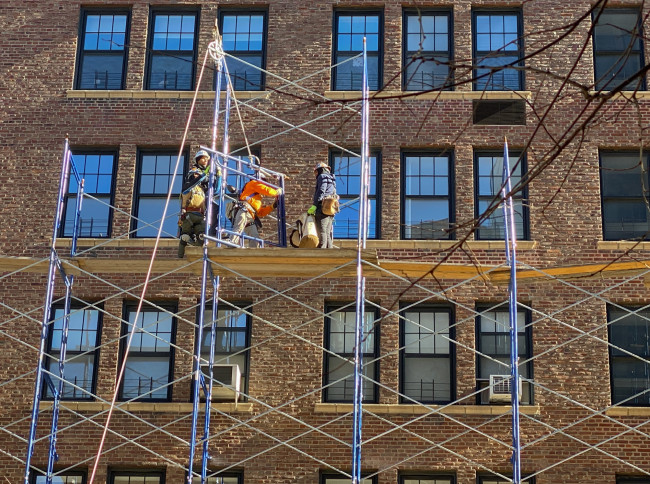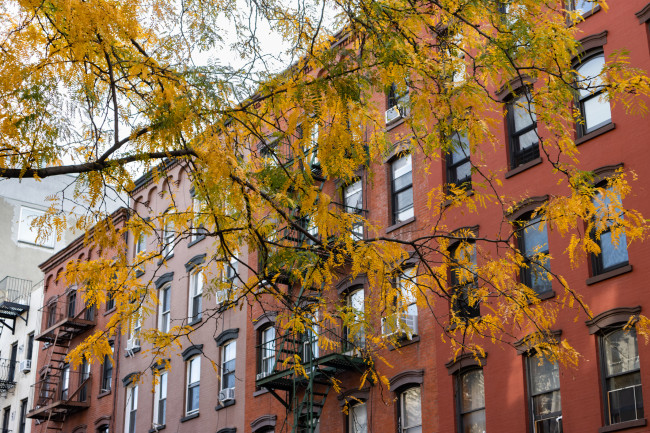5 ways condo and condo boards can prevent fake construction accident lawsuits
- Maintain a list of preferred contractors for building and unit renovations
- Check your contractor’s insurance for exemptions from covering the cost of a lawsuit
- Make sure scaffolding doesn’t obstruct any security cameras during construction

Your board should make sure that your building and your contractor have appropriate insurance coverage.
iStock
An accident during a renovation at your New York City condo or co-op building is every board’s nightmare. But buildings should also be wary of another threat: falsified accident claims.
Fraudulent construction accident claims have garnered headlines and a recent protest over the past year. Three property managers Brick Underground spoke with had seen suspicious lawsuits where a construction worker claimed to have been injured while working at a condo or co-op building, including a suit with no ambulance records or witnesses.
While accident fraud doesn’t appear to be widespread for condos and co-ops, some NYC property managers are advising caution when it comes to renovation work.
Read on for a few steps your board should take to guard against sketchy lawsuits, and to prevent being held liable for a construction accident claim broadly.
Work with a reputable contractor
A good contractor can be a huge asset when it comes to finishing a project on time, and—hopefully—under budget. They’re also your building’s first line of defense against construction accidents.
Your contractor needs to ensure their employees have the necessary equipment and legally required safety training, said Andriana Vamvakas, the president of the construction consulting company Andromeda Advantage. They also need to know who is on your building’s job site and when, so you have a record that you can check against any future claims.
Buildings should also keep a list of preferred contractors, electricians, or plumbers for building-wide projects and smaller jobs, if a shareholder or owner needs a recommendation for an apartment renovation, said Andrew Freedland, an attorney at Herrick Feinstein. Boards should keep tabs on unreliable contractors too.
“If you have a bad experience with a contractor—whether an individual apartment renovation or something building wide—you should take that into account next time that name comes up,” Freedland said.
Make sure your contractor has appropriate insurance
Your board and property manager need to ensure that your contractor has insurance that would cover the cost of litigation if an employee were to sue over an injury. That means reading through your contractor’s policy—not just their certificate of insurance—to make sure they have adequate coverage, said Eric McPhee, director of risk management for property manager Orsid Realty.
“For most exterior projects right now, we’re requiring an umbrella of at least $10 million over the general liability limits,” McPhee. “The nature of the work could give us guidance in terms of whether we want to require more or less, but for the most part it's $10 million for exterior work, and for interior work, we’re looking at something closer to $5 million.”
Your board should look out for exclusions that would exempt a contractor from covering the cost of litigation over an employee injury, which could open you up to legal liability, McPhee added. Plus, your contract with your contractor needs to be airtight: without a valid agreement your insurance could be on the hook for accident costs, McPhee said.
And for in-unit renovations, your board needs to make sure that the owner of the apartment is responsible for any injuries or damages, said Melissa Cafiero, president of the property manager Halstead Management Company.
“For the case of contractors working within private apartments, the best thing to do is to have a really comprehensive alteration agreement, whereby the owner of the apartment bears the liability,” Cafiero said.
Does your contractor have HAZWOPER certification? HAZWOPER (Hazardous Waste Operations and Emergency Response) training ensures that they have the skills to handle hazardous materials and higher risk scenarios and may be important for certain projects. Check out this 40 hour HAZWOPER course from ETraining.
Keep your insurance coverage active
Your building’s insurance policy is a crucial backstop against claims. But your board—and your insurance broker—need to make sure that your insurance covers construction accidents, said Michael Conte, managing partner at the insurance company Honig Conte Porrino. And you need to make sure your coverage doesn’t lapse.
Conte said one of his customers—a 62-apartment co-op in Queens—saw their building’s insurance premium jump from about $27,000 to $54,000 because the board let their insurance coverage lapse for four months during a dispute with the building’s developer.
But Conte said that even a two-week gap in coverage could make it difficult for your building to find affordable coverage—or any coverage at all.
“One of the underwriting requirements that we’re seeing right now, is that if your customer has a lapse of any type, they won’t even look at the application or it will automatically decline,” Conte said.
Consider installing cameras
Orsid Realty, which manages hundreds of NYC condo and co-op buildings, strongly recommends that buildings have security cameras because it limits a building’s exposure to all kinds of claims, McPhee said.
“As a general matter, we highly suggest that buildings in our portfolio be sure that they have adequate technology in place to survey their public areas,” McPhee said. “Besides construction claims, the sidewalk claims have actually been the most expensive.”
Your board should also make sure those cameras aren’t obstructed. Scaffolding—necessary for facade renovations—can block a security camera’s view. Your board may have to relocate a camera during a project, if you don’t already have a security system, make sure to install cameras in areas where they won’t be easily blocked, he added.
Having security cameras can also make insurance carriers a little more willing to give your board a quote, said Ed Mackoul, CEO of insurance agency Mackoul Risk Solutions.
Report issues or accidents immediately
Lastly, when you see something, say something, Freedland said. The worst thing your board can do is not report an issue to your property manager—particularly if it might lead to a lawsuit later down the line.
“Work injuries and things like that in the building should be reported to management immediately,” Freedland said. “If the accident occurred on Tuesday, and we don’t know about it, and then we get sued about it a year later, it’s much harder for us to deal with it.”






























